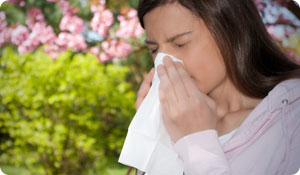
You may think you only need to worry about managing spring allergies once the snow melts away and the air gets milder. But the truth is that seasonal allergies can begin brewing while winter is still going strong.
Seasonal Allergy Facts
Experts from the National Jewish Health explain that trees already begin releasing pollen through their buds before you even notice any growth or flowering. This can occur as early as February and can spark the first signs of spring allergies. In addition, extreme winter weather and temperature shifts, as well as early warming, can lead to a more difficult spring for seasonal allergy sufferers. As a result, the most effective spring allergy treatment plan means being prepared well before the season starts.
Get a Head Start
Here are some things you can do right now to start controlling your seasonal allergies:
- Take your allergy medications regularly before you think you need them. This way, the allergy medicine will be working by the time seasonal triggers are out in full force.
- Determine what sparks your symptoms. Is it pollen that sets you sneezing and itching, or could it be the mold in the air? If you're not sure what's to blame for your allergies, now can be the ideal time to undergo some allergy testing to zero in on the problem, and determine how best to treat it before the season kicks off.
- Pay attention to the pollen and mold counts as temperatures rise. Your local newspaper and radio stations should give you a daily count of these allergens in your area. Or visit the website of the American Academy of Allergy, Asthma and Immunology (AAAAI) to view local levels provided by the National Allergy Bureau.
- Plan to stay indoors on days when pollen and mold are particularly high.
- Remember that pollen can be in the air before you see it, so be sure to wash your hair and clothing in very hot water after spending time outdoors.
- Bathe your pets often, since they may have allergy triggers trapped in their fur, as this can be enough to spur your symptoms.
- Consider undergoing allergy shots if your seasonal symptoms are very severe and don't respond to other treatment methods. Remember that it can take awhile to get the benefits of this therapy, so it's never too soon to start.
- Pay attention to other allergens that could compound your seasonal allergies. For instance, scented products, cleaning supplies, and foods and drinks can also cause allergy symptoms. Many people react to both indoor and outdoor triggers. Therefore, it's important to take steps to allergy-proof your home before the season starts.
Sources:
"Allergy Apocalypse? 2010 Spring Allergy Season among Worst on Record." American College of Allergy, Asthma and Immunology. ACAAI, 12 April 2010. Web, 7 Feb. 2011.
"Allergy: Lifestyle Management: Springtime Allergy Tips." National Jewish Health. National Jewish Health, March 2009. Web, 7 Feb. 2011.
"Ready or Not, Spring Allergy Season is Here." National Jewish Health. National Jewish Health, 3 March 2009. Web, 7 Feb. 2011.





